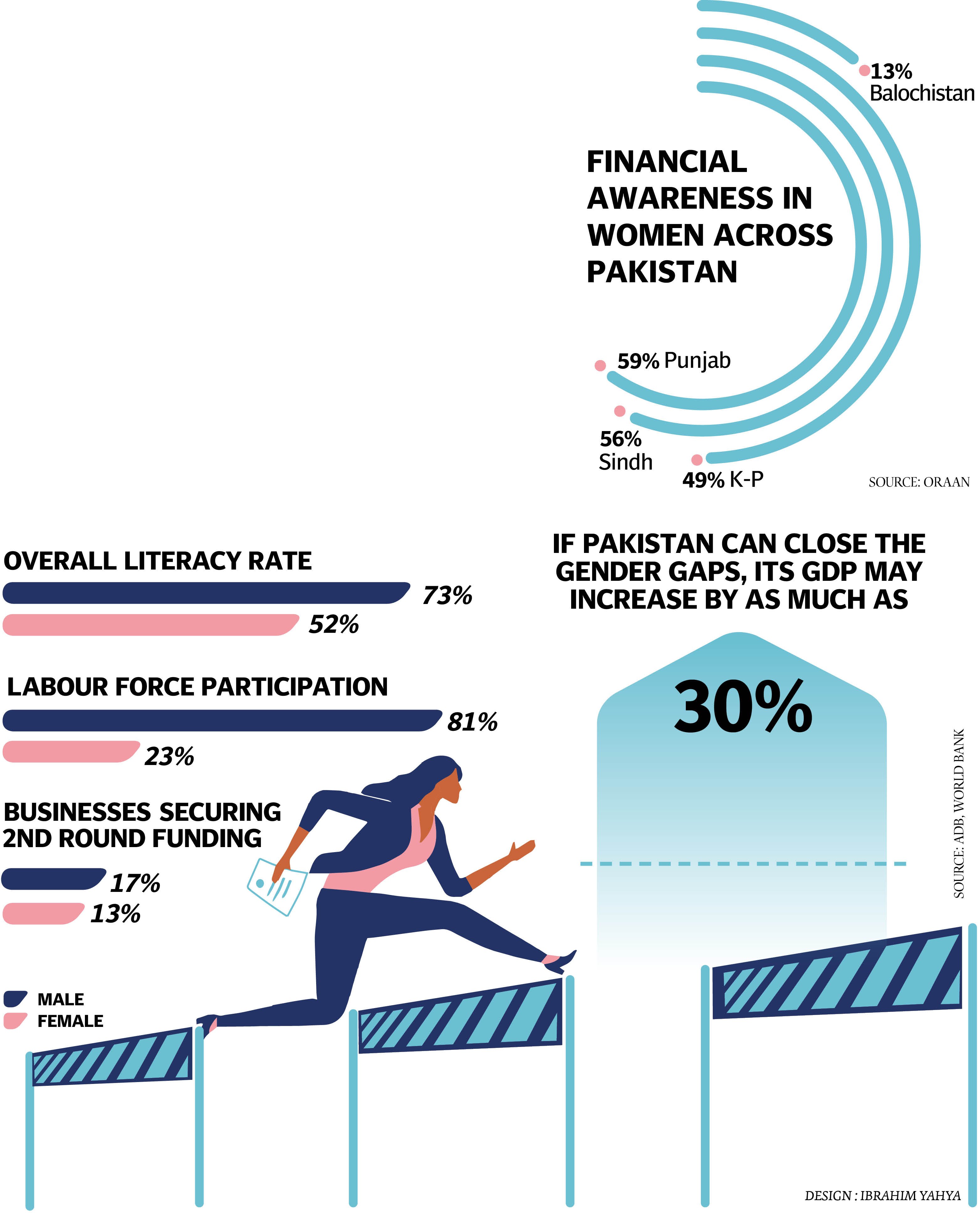A wide gender gap in capital market
PSX CEO says bourse provides equal opportunities, women do not opt for career in market

What comes to your mind when you think of the capital market and brokerage houses? Men sitting in front of computers and having intense discussion.
You wouldn’t be entirely wrong. Pakistan’s capital market and brokerage firms are indeed male-dominated. But is this because women choose not to work in this field or because the sector isn’t very welcoming?
When it comes to gender diversity, we all know that the capital market has started from a very low base. While the market has helped Pakistan’s economy to grow, it also creates inequalities.
Statistics back this up. Only 14% of staff at the Pakistan Stock Exchange (PSX) is female. This ratio gets somewhat better when we move up the ladder with 25% of the executive management team at the PSX comprising females.
“There is a glass ceiling for women in the capital market; male colleagues do not allow women to move forward,” lamented PSX’s former business development and communications head Anita Mirza.
Mirza, who is also NBP Fullerton Asset Management’s ex-head of business development, mentioned that women had to work extra hard to cross the barriers in order to make a place for themselves in the industry.

Shedding light on reasons behind the low female representation, Mirza said, “The main problem stems from the way women are raised throughout their lives.”
“Since a very young age, societal values create pressure on them. They juggle between their families, children and work,” she said, adding that men in their families channelised the talent of women towards domestic work.
“It is not just about the capital market, gender bias and gender discrimination is common in most of the industries in Pakistan,” stressed InfraZamin Pakistan Chief Executive Maheen Rahman.
Identifying the reasons, specifically in the capital market, she said society pressurised women to pay attention to their families rather than focus on career opportunities due to which the market lost qualified women at junior levels. Hence, “women are rarely seen at leadership positions in the capital market.”
Rahman was of the view that the major reason behind the lower number of female employees was the absence of a women-friendly environment.
“There are certain needs of females, which should be addressed at workplaces; women should be granted maternity leaves, they should be given equal opportunities when they resume work after a long gap.”
However, according to PSX CEO Farrukh H Khan, the stock exchange management focuses on the well-being of its female employees and provides equal opportunities.
“PSX has implemented all gender-related laws and policies pertaining to maternity benefits, harassment complaints, etc,” he emphasised.
Talking about the Diversity and Inclusion (D&I) Policy, the CEO said the comprehensive policy ensured equal opportunities for both men and women. “This policy ensures consistent employment opportunities, succession planning and compensation for male and female employees alike.”
Discussing the reasons behind the low female participation, Farrukh said women had not generally opted for a career in the capital market.
“We get the impression that women stay away from frontline fields like stock trading or dealing with stock investments,” he said, adding, “Women are entering the fields of research, capital market structuring, fund management, investment banking and related areas but are not in areas such as stock trading.”
Endorsing his views, PSX Head of Marketing and Business Development Raeda Latif said, “I do not particularly think that the capital market is a tough place for women. In fact, this is one area where women can excel.”
Latif, who is among the four women in the executive management, said usually most women got education in fields other than STEM disciplines. “Similarly, in the capital market, women don’t traditionally opt for a career and hence, we see more men than women in the market,” she said.
“However, I feel this is now changing and more women are coming in this market as we see them in research, market structuring and related fields,” Latif said.
“I am happy to say that some women have even ventured into the trading side and I am hopeful that with the passage of time, this will become the norm and more women will be working side by side with men as traders or in other fields.”
Talking about the presumed hurdles faced by women in rising to leadership positions, Latif underlined that women did not face any such obstacles in the capital market.
“Traditionally, more men than women have taken to working in this field, but now as more and more women are coming forth, this stereotype is being debunked,” she asserted.
While women are seen leading some organisations, PSX is one place where – since its establishment in 1947 – no woman has been appointed as the managing director or CEO.
However, Latif stated that it was not a matter of discrimination. “So far, we have seen more men than women entering the realm of capital market, but slowly and gradually this is changing and we will one day see a woman CEO or MD.”
Brokerage houses, one of the most important stakeholders of the capital market, are not different either.
Topline Securities Head of International Equity Sales Samar Iqbal said Pakistan’s capital market, in particular, was a tough place for women to work.
“Long working hours, less family time and being male-centric discourage women from working in brokerage firms due to which women also face hurdles to reaching the leadership positions,” she pointed out.
Iqbal emphasised that reasonable working hours, remote work facility and acceptance of more women employees could help the industry grow.
There is also a need to collaborate with universities to dismiss the argument that the capital market is just a career path for men.
The capital market needs an effective, long-term strategy to keep diverse talent. The question is how can the capital market foster an environment that is inclusive and supports career advancement for women as well as men?
Suggesting ways to retain female employees in the capital market, Rahman said the Securities and Exchange Commission of Pakistan (SECP) should introduce a policy where focus was on training, retaining and pushing women to the higher positions.
The writer is a staff correspondent
Published in The Express Tribune, March 8th, 2021.
Like Business on Facebook, follow @TribuneBiz on Twitter to stay informed and join in the conversation.



















COMMENTS
Comments are moderated and generally will be posted if they are on-topic and not abusive.
For more information, please see our Comments FAQ